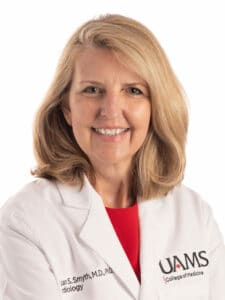
Earlier this year, Dr. Smyth joined the UAMS family as the Executive Vice Chancellor and Dean of the College of Medicine, contributing her years of expertise in cardiology, research, and academic leadership to our mission of education, research, and clinical care.
As a product of public education, Dr. Smyth believes strongly in academic medicine and the mission of Vision 2029 resonated with her as it reflects her core values as a physician and as an academic leader.
The potential to achieve dramatic improvements in the health of Arkansans is what drew Dr. Smyth to UAMS. “As the only health sciences university in Arkansas, UAMS can leverage its position to work effectively with our partners, especially those in rural and under-served communities. We aim move the needle significantly on health metrics.”
She doesn’t interpret Vision 2029 as a lofty aspiration but as an attainable goal, because of the resources and the foundation of excellence at UAMS. “We are uniquely positioned to transform health across Arkansas by harnessing the power of academic medicine, leveraging our regional programs and through meaningful community partnerships.”
Dr. Smyth has spent her entire career involved with both academia and the veteran’s affairs health care system, which dovetails well with her position at UAMS and the opportunities here. Her experiences have provided her with a valuable perspective of strategic planning, systems-based leadership and organizational growth. She sees physicians of the future spending as much time considering risk stratification, evidence-based approaches, and shared decision making in communities as they do on patient-centered care with individual patients. She refers to this as a transition from precision medicine (focused on individual patients) to precision population health (focused on communities).
Her background in research also lends a valuable perspective to her leadership approach. Running a research lab provided experience with both management and experimentation. It encouraged mental flexibility instead of rigidity, which reinforces an openness to piloting new initiatives and experimenting with changes at an administrative level to always pursue improvement and growth.
Dr. Smyth is excited by the enormous potential in store for physicians and scientists. “We select, train, and mold the future of medicine. That’s an enormous responsibility, and a rewarding opportunity. When you step back and contemplate the bigger picture around what we do, it’s something to remember every day. It’s why I love medicine and why I love what I do.”
